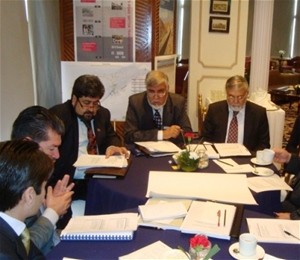
Senior Afghan officials consider the way forward in creating an independent private sector oriented Road Authority to manage and finance the nation’s road assets.
USAID/IRP
USAID brings together international road experts.
23 SEPTEMBER 2010 | KABUL, AFGHANISTAN
Thousands of kilometers of rehabilitated provincial and rural roads have fallen into disrepair. Deteriorating roads make it more difficult for Afghans to access key services such as health care and education. To address this issue, 23 senior officials from the Afghan government and leaders from the private sector recently gathered in Delhi at a USAID sponsored conference to hear practitioners from around the world discuss best practices and innovations in road management and finance.
The purpose of the “Conference on the Management and Financing of Roads” was to advance the goal of the Afghanistan National Development Strategy to provide sustainable financing and management of Afghanistan’s newly revitalized road network. It concluded with an action plan to create an independent road authority to manage the private sector delivery of both road construction and maintenance.
“Paying attention to road maintenance is one the most vital issues for Afghanistan’s economic growth,” said Azarakhsh Hafezi, President of the International Affairs Committee of the Afghan Chamber of Commerce and Industry.
Through donor funding of close to $4 billion, Afghanistan has seen its road network become one of the country’s greatest national assets. However, this valuable asset will rapidly erode if not properly managed. Engineer Khaial Mohammad, a Member of the National Assembly, warned that the “lack of attention to road maintenance creates a terrible economic impact.”
USAID has established a model for maintaining roads through the efforts of the Operations and Maintenance (O&M) project implemented by the Afghanistan Infrastructure Rehabilitation Program. During the past several years, the O&M project has been responsible for repairing more than 3,000 kilometers of road. The project also employs and trains three Afghan subcontracting companies that hire thousands of Afghan workers annually.
Creating the road authority will help achieve the goal of providing an efficient transportation system that is sustainable and responds to the people of Afghanistan. Accomplishing this goal will promote economic growth, poverty reduction, and facilitate sustained development in Afghanistan.







Comment
Make a general inquiry or suggest an improvement.